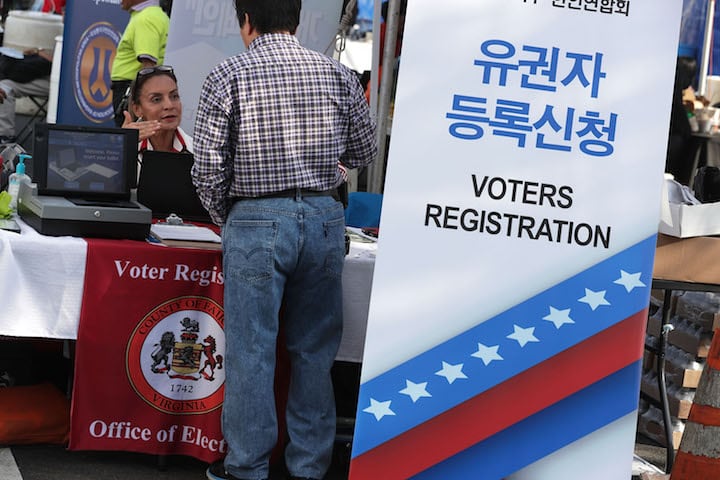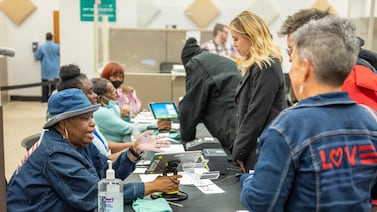A version of this post was originally distributed in Votebeat’s weekly newsletter. Sign up here.
Last week we tried to coax out the reasons behind the puzzling decision by Louisiana’s secretary of state to suspend its participation in the Electronic Registration Information Center, the nation’s only multi-state agreement to share voter roll data for the express purpose of keeping these rolls clean. This week, let’s look at the valuable role ERIC plays in election administration in order to peel back why that decision struck so many as rash and directly antithetical to Secretary Kyle Adroin’s claim that he wants to prevent voter fraud.
First, some facts about how ERIC works. Members agree to send over their full state voter rolls every 60 days along with records from a state identification or licensing agency, usually the DMV. The data must include 11 pieces of identifying information, if available, for every voter, including address, partial Social Security number, and phone number.
ERIC uses all of the data provided by its members to find people registered on more than one state’s rolls, those who have died or moved, and flawed or incomplete registrations that need to be flagged by state officials for correction. If, for example, a registered Texas voter — say, one who lived near the border — died in Louisiana, ERIC would be able to provide states with data reflecting that voter’s death. Or, if someone moved from Louisiana to Kentucky and didn’t take themselves off the rolls, ERIC would find that. The advantage of using the full voter roll (with all the identifying data fields the public doesn’t typically have access to) alongside an identification database is breadth of information — instead of just matching on names (which can be misspelled or can change) and dates of birth (which are far from unique), ERIC has access to things like past addresses and email addresses. All of which mean few false matches, and quite clear indications to the participating states which registered voters no longer belong on the voter rolls.
The organization is overseen by a board of directors, made up of elections officials from each of the member states. The program is entirely funded by its member states. Fees are dependent on population and range from about $15,000 a year to $74,000. Even at the highest possible cost, that’s an incredible deal — especially since there is an entire cottage industry built up around suing states and localities over bloated voter rolls. $74,000 is far less than the cost of a single such suit, and also likely less than the cost of a single state employee dedicated full-time to maintaining the rolls with less effective tools.
J. Christian Adams is the most prolific such litigant — largely on behalf of the Public Interest Legal Foundation. He was also the only named source for Gateway Pundit’s hit job on ERIC, which falsely claimed the organization was funded by George Soros and gave unauthorized third parties access to the data. Yes: A man who profits from suing counties and states for dirty voter rolls opposes a program that makes voter rolls cleaner.
In fact, partly as a result of Adams’ lawsuits, ERIC’s membership has seen an uptick. Kentucky, for example, joined after PILF and Judicial Watch filed suit against the state and former Secretary of State Allison Lundergan Grimes in 2017, accusing her — accurately — of failing to clean the roles for more than a decade. As part of the settlement, Kentucky joined ERIC. And officials like it!
“Kentucky belongs to ERIC pursuant to a federal court order, following a successful lawsuit against Secretary [Michael] Adams’ predecessor for failure to maintain the voter rolls,” said Michon Lindstrom, spokesperson for Kentucky’s secretary of state, a Republican. “ERIC has been useful in providing information enabling us to clean up the rolls, including removal of over 10,000 dead voters in one month alone.”
Similar news out of Texas, which is one of the newest ERIC members. In 2020, the legislature explicitly appropriated funds for this purpose. Texas law requires the state to be part of a data-sharing program to clean the voter roll, and while Texas was a longtime participant in Kansas’s Crosscheck (remember Crosscheck?), ERIC has been the only such data-sharing program since Crosscheck went belly up in 2017 after reporters (myself included) repeatedly wrote about its cybersecurity problems and after lawsuits successfully showed that Kansas had mismanaged the data.
“Texas has used the valuable data that ERIC provides to identify duplicate cross-state voter registrations, voters who have potentially cast a ballot in Texas and another state, and potential votes cast in the name of deceased individuals, which our office utilized as part of Phase I of our agency’s audit of the 2020 General Election in Texas,” said Sam Taylor, spokesperson for Texas Secretary of State John Scott. “This program is a key tool for election integrity in Texas, and we appreciate our partnership with the ERIC member states.”
ERIC has succeeded where Crosscheck has failed. Rather than emailing sensitive voter data and passwords back and forth and storing it all on an unprotected server, as Crosscheck did, ERIC follows specific and extensive security protocols — as detailed in its bylaws and this explainer — and a board of cybersecurity experts advise the program as part of its Privacy and Technology Advisory Board.
The breadth of data compared by ERIC and its security measures have led states of all political tilts to see its value. Alex Curtas, spokesperson for New Mexico Secretary of State Maggie Toulouse Oliver, a Democrat, reports that “the state’s voter rolls are significantly more accurate than ever before.” The secretary calls ERIC “proactive and pro-voter.”
In fact, no other state but Louisiana has so far expressed concerns. One candidate for secretary of state in Alabama has pledged to withdraw the state from the program, citing the same concerns expressed by Ardoin, but he was slapped down by the current secretary — John Merrill, hardly a liberal — who said the candidate suffered from “a lack of understanding about how the elections process works in our state.”
Back Then
J. Christian Adams’ opposition to ERIC is particularly baffling given his full-throated support for Crosscheck, which was run by Kris Kobach, the former secretary of state for Kansas. In 2017, Adams penned an op-ed for The Hill declaring, “States should always be on the lookout for new ways to collaborate in the hopes of keeping pace with the electorate.” He also touted Trump’s voter fraud commission — of which he was a member — which sought publicly available voter rolls for every single state with the hopes of doing a matching process similar to Crosscheck and ERIC.
In Other Voting News
- It is not looking good out there for voting rights and redistricting cases, which are being swatted down by conservative judges across the country. NPR has a piece spelling out the concerns of those who think this may do “lasting damage.”
- This week the Miami Herald came out with a blockbuster investigation that revealed Republican canvassers in Miami-Dade had changed at least 100 voters’ party affiliation to Republican, allegedly without their consent. The State Attorney’s Office is now investigating, and a Republican legislator has already introduced a bill that would increase the penalty for such an offense. Also on the Senate floor: the creation of a state police division to investigate election crimes.
- Pennsylvania’s Supreme Court ended the redistricting process by picking a congressional map this week and leaving the May 17 primary date in place, instead choosing to move earlier deadlines for candidates who were being squeezed by rapidly approaching due dates without firm district lines. Besides the loss of one district, the new map is very similar to the current map, and is unlikely to result in a shift in the state delegation’s partisan balance.
- The Guardian’s Sam Levine published evidence Thursday that undercut Shelby County, Tennessee’s case against Pamela Moses, who was jailed after attempting to register to vote while on probation. Moses believed her probation had expired when she registered, though the county alleged she’d tricked a probation officer into signing a form indicating her probation was completed. Through a public records request, Levine found that corrections officials had investigated at the time and found that her probation officer — not Moses — was at fault for the error. On Friday, a judge ordered a new trial and Moses was set to be released from jail.
- There appears to be no end to the quest for new voting machines in Louisiana, where the commission in charge of making a recommendation for a new voting system has again delayed their final decision. This time it’s so the members of the commission can physically inspect the machines on their own before issuing a recommendation.
- A bill that would require “smart” drop boxes that keep track of ballots and take pictures of those who drop off their ballots would cost 500 percent more than drop boxes currently in use, the AZ Mirror has found. If you are asking yourself why such a thing would be necessary, good question: There is no evidence of any problem with the current drop boxes. And if you are asking yourself, “What is a smart drop box anyway?” Good question, because they don’t exist.
- Republican activist Christian Horn has announced his candidacy for Alabama secretary of state. If elected, he would be the first Black candidate elected to statewide constitutional office in Alabama history. John Merrill, the current secretary, is term limited. Horn joins three others in the Republican primary for the position.
- The chair of the Delaware GOP has sued the state, claiming new laws expanding mail-in voting and introducing early voting violate the state Constitution.
- A nursing home employee in Michigan has pleaded guilty to three counts of misdemeanor election fraud. She submitted voter registrations for nursing home residents who had not told her they wanted to register, forging their signatures. She was caught after the county elections office flagged the signature mismatches — an example of election administration safeguards that are effective at catching this kind of blatant fraud.
Good News of the Week
Shawnee, Oklahoma, resident Peggy Harwell, age 87, has been a poll worker in Pottawatomie County for 29 years, making her the longest serving poll worker in the county’s history. Harwell comes back year after year because she loves serving the people of her county and meeting new people, she told the Shawnee News-Star. She encourages younger residents to give it a try. “See how you can enjoy it and seeing the people of our county,” Harwell said.
Harwell was featured as part of the Shawnee News-Star’s “Heroes of Democracy” series, which features the local people who make local elections possible. Other subjects have included a couple who worked the polls together and a 92-year-old poll worker named Peggy.






